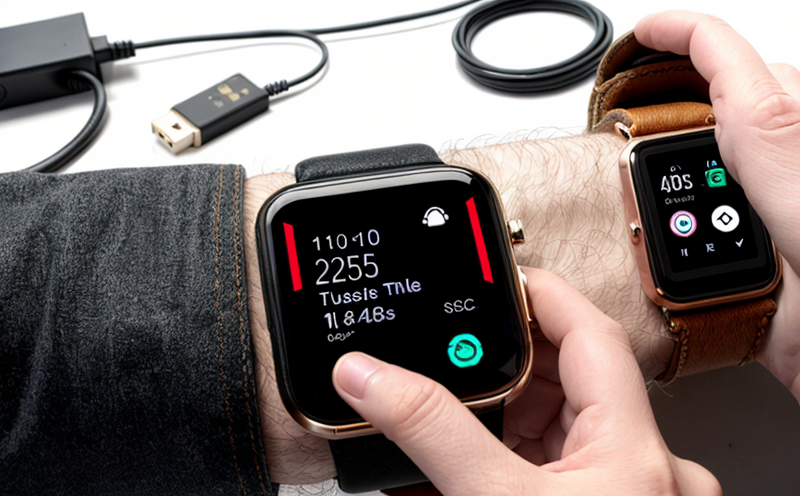ISO 10993 Biocompatibility Testing for Skin Contact Wearable Devices
The ISO 10993 series of standards is a cornerstone in the field of medical device testing, ensuring that devices intended to come into contact with human skin or mucous membranes are safe and do not cause adverse reactions. This service focuses specifically on biocompatibility testing for wearable and portable electronic devices that make direct contact with the skin.
Wearable technology has seen rapid growth in recent years, encompassing smartwatches, fitness trackers, medical alert systems, and other devices designed to monitor health metrics or enhance daily life. These products often feature materials such as silicone, rubber, plastics, and metals that may come into direct contact with the skin. To ensure these devices are safe for prolonged use, compliance with ISO 10993 standards is crucial.
The testing process involves a series of evaluations to assess potential adverse effects on human health, including irritation, allergic reactions, and systemic toxicity. The specific tests required depend on the materials used in the device, its intended contact time, and the expected duration of use by the wearer. This service ensures that all relevant testing parameters are met according to ISO 10993 guidelines.
Materials used in wearable devices can vary widely—from biocompatible polymers like silicone or polyurethane to metallic components such as stainless steel or titanium. Each material must be evaluated for its potential to cause skin irritation or allergic reactions. For example, studies have shown that certain plastics and metals can release harmful chemicals when exposed to heat or moisture, which could lead to adverse effects on the wearer.
The testing process typically begins with a detailed review of the device’s materials and expected contact time. This information is used to determine which specific tests are necessary. Common tests include:
- Acute dermal irritation
- Sensitization (allergic) potential
- Systemic toxicity studies
- Subchronic toxicity studies
The testing process involves exposing specimens of the device to skin tissue cultures or living animals, depending on the test. Specimens are then analyzed for signs of irritation, inflammation, or other adverse effects. These tests provide a comprehensive evaluation of the device’s safety and ensure compliance with international standards.
For R&D engineers working in this sector, ensuring biocompatibility is critical to avoiding costly recalls and legal issues. By partnering with a reputable laboratory that specializes in ISO 10993 testing, organizations can ensure their products meet regulatory requirements and are safe for consumers. This service also provides detailed reporting on the results of each test, offering valuable insights into potential areas for improvement.
The importance of biocompatibility testing cannot be overstated, especially given the increasing prevalence of wearable technology in both consumer and medical markets. As these devices become more integrated into daily life, ensuring their safety is paramount. By adhering to ISO 10993 standards, manufacturers can demonstrate a commitment to quality and reliability, fostering trust with consumers.
Why It Matters
The biocompatibility of wearable devices that make skin contact is crucial for ensuring the safety and well-being of users. These devices often remain on the body for extended periods, increasing the likelihood of adverse reactions if materials are not properly tested.
One key concern with these devices is the potential release of chemicals from materials used in their construction. For example, some plastics and metals may degrade over time when exposed to environmental factors such as heat or moisture, releasing harmful substances into the skin. This can lead to irritation, rashes, or more severe allergic reactions.
Another important factor is the duration of contact between the device and the wearer’s skin. Some devices are worn only during physical activities, while others may be used for extended periods throughout the day. The longer the exposure time, the greater the risk of adverse effects if the materials are not biocompatible.
Biocompatibility testing helps identify potential risks early in the product development process, allowing manufacturers to make necessary adjustments before the device reaches the market. This proactive approach can save significant time and resources by preventing costly recalls and legal issues.
Consumer trust is also a critical factor for wearable technology companies. By ensuring their products meet rigorous biocompatibility standards, manufacturers can build a reputation for producing safe and reliable devices. This can lead to increased market share and customer loyalty.
Quality and Reliability Assurance
- Compliance with ISO Standards: Our laboratory adheres strictly to the requirements outlined in ISO 10993, ensuring that all testing processes are conducted according to international best practices.
- Consistent Testing Methods: We use standardized methods for specimen preparation and exposure, providing consistent results across multiple tests.
- Expertise in Material Analysis: Our team of experienced scientists has extensive knowledge of various materials used in wearable devices, allowing us to tailor our testing protocols to each specific product.
- Accurate Reporting: Detailed reports are provided for every test conducted, offering comprehensive insights into the biocompatibility of the device.
The quality and reliability of a wearable device’s materials can significantly impact its performance and user experience. By ensuring that these materials meet rigorous biocompatibility standards, manufacturers can enhance the overall quality and trustworthiness of their products. This is particularly important for devices intended to be worn on the skin for extended periods.
International Acceptance and Recognition
The ISO 10993 series of standards has been widely adopted by regulatory bodies around the world. Compliance with these standards is a key requirement for medical devices, including wearable electronics that make skin contact.
In Europe, the European Commission’s Medical Device Regulation (MDR) requires manufacturers to demonstrate compliance with ISO 10993 before placing their products on the market. Similarly, in the United States, the Food and Drug Administration (FDA) often looks for evidence of biocompatibility testing according to these standards.
The international recognition of ISO 10993 ensures that manufacturers can confidently export their products without facing compliance issues in different regions. By adhering to global standards, companies can ensure that their wearable devices meet the highest safety and quality requirements, fostering trust with consumers worldwide.





